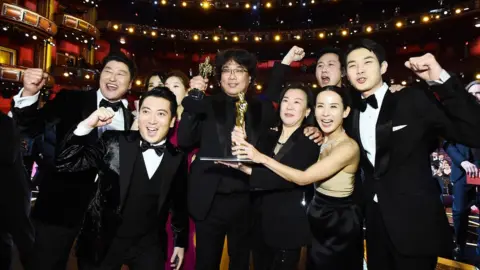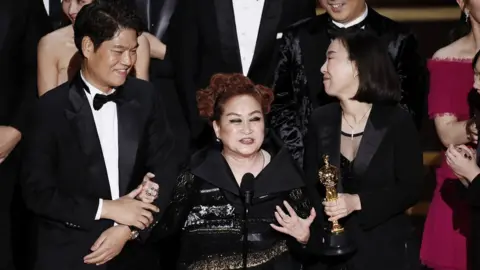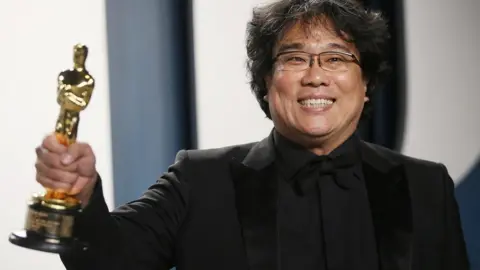Parasite: What the Oscar win means for Korean cinema
 Getty Images
Getty Images"A miracle has happened," said South Korean film critic Ha Sung-tea.
"I'm overwhelmed. In tears," tweeted Korean cinema expert Jason Bechervaise, who was watching the Oscars with his son.
Social media went into meltdown during the Oscars, and this was just a snippet. Korean pride in this cinematic masterpiece swept through my Twitter timeline.
And by the time Parasite was named best picture - winning its fourth Oscar - the voices across the country had reached a crescendo of wild congratulatory joy.
Yes, this is historic. Bong Joon-ho's comedy-thriller is the first non-English language film to win best picture. But to South Korea, these awards mean more than that.
It is a cultural breakthrough.
For a decade this country has ploughed money into the so-called Korean wave or Hallyu - K-drama, K-pop and Korean cinema.
The accolades from the Academy are proof that this cultural wave has come crashing down on Hollywood.
Still, director Bong Joon-ho believes his influence is nowhere near that of K-pop idols BTS.
"I think BTS has 3000 times the power and influence I have. I think Korea produces a lot of great artists because we are a very emotionally dynamic people," he told reporters outside the Oscars.
Korean cinema has been a force in its own right for more than 15 years, says Mr Bechervaise, who works as a professor at the department of entertainment and arts at Korea Soongsil University.
"But it has taken time for it to get recognition within award bodies in the US, and even a festival like Cannes - it took a long time before they finally awarded a Korean film with the Palm d'Or.
"It felt like it was only a matter of time before they would take notice, with Burning coming so close last year, and The Handmaiden winning a Bafta in 2018."
 Getty Images
Getty ImagesIn some ways the seeds of success had been sown. South Korea is a nation of movie-goers and its film industry is the fifth biggest in the world in terms of box office sales.
Director Bong Joon-ho's talent was also well acknowledged. Memories of Murder, The Host, the science fiction thriller Snowpiercer and Okja - about a genetically modified giant pig - all won him critical acclaim.
"Bong Joon Ho's use of storytelling is wildly innovative, unpredictable and extremely entertaining," explains Prof Bechervaise, who has studied Bong's work for 15 years.
"He's able to take audiences in directions few other filmmakers are able to do in a movie, let alone in a single scene: from moments of humour to horror in an instant without making it jarring."
But it is Parasite which has given Bong his big global breakthrough - and for so many reasons.
The film is about class warfare. It is about rich and poor - a universal theme which has made it possible for this South Korean story to resonate with audiences around the world.
This vision is brought to life by an all-star and experienced South Korean cast who take us through plot twists which keep us guessing right until the very end.
The film's distributor, Neon has also been very savvy, says Prof Bechervaise.
"They orchestrated a very clever and effective release strategy, releasing it on a small number of screens in October before expanding it as strong word-of-mouth pulled more people in.
"As it added to its accolades, its box office success grew even further."
There is another Korean figure behind Parasite's success - co-producer Miky Lee who got the last word at the Oscars (after the audience protested when the lights went down).
She is vice chair of the South Korean conglomerate CJ Group. Very little happens in TV or film in South Korea without her involvement.
She is said to be a true film fanatic and has backed several of Bong's films. Her influence will have been considerable.
It seems ironic that this social satire about class warfare came about with the help of one of South Korea's richest companies, but all of these factors combined appear to have created a surprise hit.
 EPA
EPAAudiences have forgotten any fear they may have had of the "one inch barrier of subtitles" (as Bong himself put it at the Golden Globes).
But can others emulate his success? Especially if he had such powerful backers from private companies.
President Moon Jae-in said his government would support Korean cinema as he started his cabinet meeting with a round of applause for Parasite.
"Parasite has moved the hearts of people around the world with a most uniquely Korean story," he said. "It reminds us of how touching and powerful a movie can be."
This year the Korean Film Council has allocated 100 billion won (£65m; $85m) for film development. That's a 32% increase on last year.
But building on this success won't be easy, says film critic Ha Sung-tea.
"To create the next Bong Joon-ho will be a long term project for the Korean film industry. Director Bong Joon-ho is unique.
"I think now the government, the industry, and big conglomerates need to all work together to promote diverse creators and their unique perspectives."
Prof Bechervaise agrees.
"The younger generation don't have the same kind of opportunities their predecessors had as studios grow more powerful.
"That being said, Korean cinema is in a very strong position going forward and the infrastructure is there to find further success."
But just as Bong Joon-ho stared disbelievingly at his first Oscar while the world watched and smiled, now is a moment to bask in South Korean cinema's current success.
 Reuters
ReutersDuring his acceptance speech for Best Screenplay, Bong told the audience, "we never write to represent our countries".
However, in the next breath, he said, "but this is a very first Oscar to South Korea."
This feels personal for this country. My team went to the pizza shop featured in the film where an enthusiastic fan told us this was South Korea's greatest moment.
Since the Korean peninsula was split at the end of World War Two, there has been a deep-rooted insecurity here. A feeling that perhaps people can only point to it on a map because it's next to a nuclear weapon-owning dictator in the North.
The Oscars is affirmation that South Korea is a cultural powerhouse - and it now has a place in the history books.
If audiences didn't know the considerable cultural talent within this country before, they do now.
